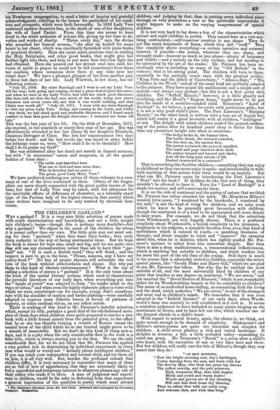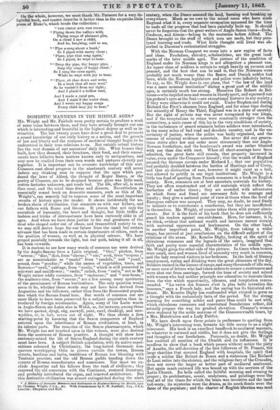THE CHILDREN'S GARLAND.*
WHY a garland ? It is a very nice little selection of poems made with much discrimination and knowledge, and not a little insight into children's tastes—though this is perhaps more doubtful—but why a garland ? We object in the name of the children for whom it is meant rather than our own. The little girls may not mind ask- ing for their "garland," when they want their books ; they early learn audacity in the way of facing sentimental ideas. But we hope the book is meant for boys also, small and big, and we are quite sure they will use any circumlocution rather than ask to have their "gar- land" out. "It is such a foolish word," they will think ; and the request is sure to go in the form, "Please, mamma, may I have my poetry-book ?" No boy of proper shyness will articulate the real title of the book without awkwardness and shame. But why put them to this kind of chronic embarrassment? What is the use of calling a selection of poems a "garland." It is the only trace about the book of the unreal literary notions which used to characterize the juvenile literature of our early days, when everything put into the "hands of youth" was adapted to form "its tender mmd to the ways of virtue," and when even the highly elaborate jokes in verse with which we were entertained—as for example, young Jim's misadven- ture with his shoulder of mutton and batter-pudding—were carefully adapted to impress some didactic lesson in favour of patience or honesty, or other cardinal virtue, on our infant minds. There is nothing of this kind in Mr. Patmore's tasteful selection which, except its title, partakes a good deal of the old-fashioned meta- phor of those days when children were quite prepared to receive a new book with a little formal speech from the parental giver, to the effect that he or she was thereby twining a wreath of flowers round the mental brow of the child which he or she trusted might prove to be a wreath of insmortelles. Bat we don't do this kind of thing now-a- days, and it is a pity when the only considerable flaw in the work is a false title, which is always staring you in the face. We say the only considerable flaw, for we do not think that Mr. Patmore has applied a very perfect test in determining by individual experiment in every case what would or would not "actually please intelligent children.' If you can catch your independent and normal child, and try them all on him, it is all very welL But, besides the profound remark that children differ, it is very necessary to remember that many of them are so full of love of approbation, that they are extremely likely to feel a superficial and temporary interest in whatever pleases any one of their elders who reads it to them. A man of judgment and experi- ence in children, would be far safer in deducing from that experience a general impression of the qualities in poetry which most attract • The Children': Garland from the best Poets. Selected and arranged by Coventry Patmore. Macmillan.
children, and judging by that, than in putting every individual piece through so very precarious a test as the particular impressions it ' might happen to make on the varying temperament of special children.
It is not very hard to lay down a few of the characteristics which attract and repel children in poetry. They cannot bear as a rule any- thing sentimental,---eq-conscious emotion in any shape. They do not like much luxuriance of fancy, which they call "stuff." They like simplicity above everything—a certain narrative and external interest, if possible—the points, whatever they are, sharp, and strongly made—humour as much as you please—plenty of buoyancy and vitality—and a melody on the very surface, and not needing to be extricated by. the art of the reader. Mr. Patmore has been ex- ceedingly wise in including so many of the "Old Ballads" in the volume; that is his strong point. The children will turn to these, especially to the partially comic ones, with the greatest avidity. "King John and the Abbot of Canterbury," "Allan-a-Dale," "The Children in the Wood," and all of the same kind are perfectly adapted to the purpose. They have quaint life and humour, and a simple sort of melody—not always very perfect—but this is not a first point with. children. The "Suffolk Miracle," however, is a little ghastly and terrifying, and like Hood's "Eugene Aram," ought never to be put into the hands of a sensitive-minded child. Tennyson's "Lord. of Burleigh" is, we believe, a great favourite with precocious girls; but it is not a very good child's piece. The Poet Laureate's "Sleeping Beauty," on the other hand, is written with a true air of boyish fun, which will render it a great favourite with all children, "intelligent" or not. The delight with which children read of the general awaken- ing of the palace after its hundred years' sleep is better for them than any premature insight into ideas or emotions : "The hedge broke in, the banner blew,
The butler drank, the steward scrawled, The fire shot up, the marten flew, The parrot screamed, the peacock squalled. The maid and page renewed their strife The palace banged and buzzed and clackt, And all the long-pent stream of life Dashed downward in a cataract !"
That is something like food for children,—something they can enjoy in childhood as they can never enjoy it again: and intentionally to with- hold anything of that nature from them would be an impiety. But what can Mr. Patmore mean by introducing the Poet Laureate's "Dora" into his book ? If children do like that sort of thing, they shouldn't be allowed to have it. Even the "Lord of Barleige is a shade too mature and self-conscious for them.
It is on the side of sentiment and the poetry of nature that we think Mr. Patmore has rather overshot his mark. Mr. Monckton Milnes's musical little poem, "I wandered by the brookside, I wandered by the mill," is not the kind of thing for children, and we miss some which we know to be generally great favourites with children, though the sentiment is of a kind to be appreciated still more deeply in later years. For example, we do not think that the selections from Wordsworth are very happily chosen. There is a profound simplicity about Wordsworth, a boyish simplicity in his pleasures, a brightness in his subjects, a complete freedom from even that kind of morbidness which is natural to youth,—a sparkling freshness of thought, and direct impulse to teach and "improve' the occasion about him, when he is didactic, which has rightly guided Mr. Pat- more's instinct to select from him somewhat largely. But then there is also a deep meditativeness, a transcendental reflectiveness, which is anything but suitable to children, and which renders him far more the poet of the old than of the young. Still there is much in his poems that is admirably suited to children, especially the rather quaint pieces, like "Goody Blake and Harry Gill," which we are glad to see Mr. Patmore has taken. But why has he omitted the most suitable of all, and the most universally liked by children of any piece that touches in any degree on sentiment, "We are seven," and yet inserted the "Seven Sisters of Binnorie," which is not remarkable either for its Wordsworthian beauty or for its suitability to children ? The sense of an undivided home-feeling, as connecting both the living and the dead, which underlies "We are seven," is one of the strongest and most real in children's minds. We remember that it was even adopted in the "Enfield Speaker" of our early days,' when Words- worth's fame was scarcely so well established as it now is. It seems a mistaken judgment to have included so many pieces hinging on the sentiments of lovers, and to have left out this, which touches one of the deepest chords in a child's heart. With regard to natural beauty, again, the choice is, we think, not quite severe enough in its demand of simplicity. Shakspeare's and Milton's nature-poems are quite too luxuriant and complex for children. A child never admires a rich and varied landscape. It delights in streams, a hill, a little secluded valley—something its mind can grasp. Mr. Tennyson's "Brook" is a poem after a child's own heart, with the exception of one or two lines here and there. But few children will really care for this of Milton's, though they may assert that they do:
"ON MAY MORNING.
"Now the bright morning star, day's harbinger, Comes dancing from the east, and leads with her The flow'ry May, who from her green lap throws The yellow cowslip, and the pale primrose.
Hail, bounteous May, that doth inspire Mirth and youth and warm desire !
Woods and groves are of thy dressing,
Hill and dale doth boast thy blessing. Thus we salute thee with our early song, And welcome thee, and wish thee long."
On the whole, however, we must thank Mr. Patmore for a very de- lightful book, and canitot describe it better than in the exquisite little poem of Blake's, which heads the collection:
"THE CHILD AND THE PIPER.
"Piping down the valleys wild, Piping songs of pleasant glee, On a cloud I saw a child, And he, laughing, said to me, "'Pipe a song about a lamb,' So I piped with merry cheer ; Piper, pipe that song again,' So I piped, he wept to hear.
"Drop thy pipe, thy happy pipe, Sing thy songs of happy cheer.' So I sang the same again, While he wept with joy to hear.
" ' Piper, sit thee down and write In a book that all may read.'
So he vanish'd from my sight ; And I plack'd a hollow reed, And I made a rural pen, And I stain'd the water clear, And I wrote my happy songs Every child may joy to hear."































 Previous page
Previous page